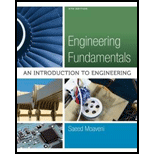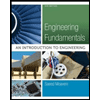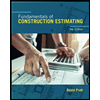
Engineering Fundamentals: An Introduction to Engineering (MindTap Course List)
5th Edition
ISBN: 9781305084766
Author: Saeed Moaveni
Publisher: Cengage Learning
expand_more
expand_more
format_list_bulleted
Question
Chapter 18, Problem 30P
To determine
Create a graph for the moment of inertia
Expert Solution & Answer
Want to see the full answer?
Check out a sample textbook solution
Students have asked these similar questions
A soil profile is shown below. If a uniformly distributed load Aσ is applied at the
ground surface, what is the settlement of the clay layer caused by primary
consolidation if
a. The clay is normally consolidated
b. The clay is over-consolidated with σzc=200 kPa
c. The clay is over-consolidated with σzc=150 kPa
(Take Cr 0.03 and Cc = 0.15)
Ao 100 kN/m²
2 m
4 m
3.5 m
Sand
Clay
Xtry 14 kN/m³
Groundwater table
Yat 18 kN/m³
Yat 19 kN/m³
Void ratio, e 0.8
An existing 4-lane freeway (2 lanes in each direction) is to be expanded. The segment length is 2 mi (3.2 km); sustained grade: 4%; design volume of 3000 veh/h; trucks: 10%; . buses: 2%; RVs: 3%; PHF: 0.95; free-flow speed: 70 mi/h (112 km/h); right side lateral obstruction: 5 ft (1.5 m); design LOS: B. Determine number of additional lanes required in each direction
8.2 only
Chapter 18 Solutions
Engineering Fundamentals: An Introduction to Engineering (MindTap Course List)
Ch. 18.2 - Prob. 1BYGCh. 18.2 - Prob. 2BYGCh. 18.2 - Prob. 3BYGCh. 18.2 - Prob. 4BYGCh. 18.2 - Prob. BYGVCh. 18.3 - Prob. 1BYGCh. 18.3 - Prob. 2BYGCh. 18.3 - Prob. 3BYGCh. 18.3 - Prob. BYGVCh. 18.4 - Prob. 1BYG
Ch. 18.4 - Prob. 2BYGCh. 18.4 - Prob. 3BYGCh. 18.4 - Prob. 4BYGCh. 18.4 - Prob. BYGVCh. 18.5 - Prob. 1BYGCh. 18.5 - Prob. 2BYGCh. 18.5 - Prob. 3BYGCh. 18.5 - Prob. 4BYGCh. 18.5 - Prob. BYGVCh. 18.6 - Prob. 1BYGCh. 18.6 - Prob. 2BYGCh. 18.6 - Prob. 3BYGCh. 18.6 - Prob. 4BYGCh. 18.6 - Prob. BYGVCh. 18.7 - Prob. 1BYGCh. 18.7 - Prob. 2BYGCh. 18.7 - Prob. BYGVCh. 18 - Prob. 1PCh. 18 - Prob. 2PCh. 18 - Prob. 3PCh. 18 - In Chapter 12, we explained that the electric...Ch. 18 - The deflection of a cantilevered beam supporting...Ch. 18 - Prob. 6PCh. 18 - Prob. 7PCh. 18 - Prob. 8PCh. 18 - Prob. 9PCh. 18 - Prob. 10PCh. 18 - Prob. 11PCh. 18 - Prob. 12PCh. 18 - Prob. 13PCh. 18 - Prob. 14PCh. 18 - A jet plane taking off creates a noise with a...Ch. 18 - Prob. 16PCh. 18 - Prob. 17PCh. 18 - Prob. 18PCh. 18 - Prob. 19PCh. 18 - Prob. 20PCh. 18 - Prob. 21PCh. 18 - Prob. 22PCh. 18 - Prob. 23PCh. 18 - Prob. 24PCh. 18 - Prob. 25PCh. 18 - Prob. 26PCh. 18 - Prob. 27PCh. 18 - Prob. 28PCh. 18 - Prob. 29PCh. 18 - Prob. 30PCh. 18 - Prob. 31PCh. 18 - Prob. 32PCh. 18 - Prob. 33PCh. 18 - Prob. 34PCh. 18 - Prob. 35PCh. 18 - Prob. 36PCh. 18 - Prob. 37PCh. 18 - Prob. 38PCh. 18 - Prob. 39PCh. 18 - Prob. 40PCh. 18 - Prob. 41PCh. 18 - Prob. 42PCh. 18 - Prob. 43PCh. 18 - Prob. 44PCh. 18 - Prob. 45P
Knowledge Booster
Similar questions
- 5.6 A section of highway has the following flow- density relationship q = 50k - 0.156k2 [with q in veh/h and k in veh/mi]. What is the capacity of the highway section, the speed at capacity, and the density when the highway is at one-quarter of its capacity?arrow_forward8.20 Two routes connect a suburban area and a city, with route travel times (in minutes) given by the expressions t₁ = 6 + 8(x₁/c₁) and t₂ = 10 + 3(x2/c2), where the x's are expressed in thousands of vehicles per hour and the c's are the route capacities in thousands of vehicles per hour. Initially, the capacities of routes 1 and 2 are 4000 and 2000 veh/h, respectively. A reconstruction project on route 1 reduces the capacity to 3000 veh/h, but total traffic demand is unaffected. Observational studies note a 35.28-second increase in average travel time on route 1 and a 68.5% increase in flow on route 2 after reconstruction begins. User-equilibrium conditions exist before and during reconstruction. If both routes are always used, determine equilibrium flows and travel times before and after reconstruction begins.arrow_forward8.19 Three routes connect an origin and a destination with performance functions t₁ = 8+ 0.5x1, t2 = 1 + 2x2, and t3 = 3 + 0.75x3, with the x's expressed in thousands of vehicles per hour and the 's expressed in minutes. If the peak-hour traffic demand is 3400 vehicles, determine user-equilibrium traffic flows.arrow_forward
- 8.8 onlyarrow_forward8.4 Consider a Poisson regression model for the number of social/recreational trips generated during a peak-hour period that is estimated by (see Eq. 8.3) BZ = -0.75 +0.025(household size) + 0.008(annual household income, in thousands of dollars) + 0.10(number of nonworking household members). Suppose a household has five members (three of whom work) and an annual income of $100,000. What is the expected number of peak-hour social/recreational trips, and what is the probability that the household will not make a peak-hour social/recreational trip?arrow_forward8.15 An origin-destination pair is connected by a route with a performance function t₁ = 8+ x1, and another with a function t₂ = 1 + 2x2 (with x's in thousands of vehicles per hour and t's in minutes). If the total origin-destination flow is 4000 veh/h, determine user-equilibrium and system-optimal route travel times, total travel time (in vehicle minutes), and route flows.arrow_forward
- 8.13 Consider the situation described in Problem 8.11. If the total number of trips remains constant, determine the amount of amusement floor space that must be added to destination 2 to attract an additional 50 social/recreational trips.arrow_forward5- A basic freeway has 3 lanes in each direction and is on flat terrain. It has a jam density of 190 veh/km and a capacity of 4750 veh/h. The spot speed of 5 cars was collected at the midpoint of a 3.4 km segment of this freeway. Vehicle Speed (km/hr) 1 86 2 89 3 95 4 5 99 100 a) Calculate the space mean speed b) Calculate the free flow speed based on the given information c) A directional weekday peak-hour volume of 4640 vehicles is observed, with 1320 vehicles arriving in the most congested 15-min period. If the traffic stream has 12% large trucks and buses determine the level of service 6- What are the steps that a 4-step model used to predict travel demand on roads network consists of? Briefly describe was sort of information each step provides? 7- The bitumen is a conventional bituminous binder has a penetration index of -1 and = 65°c. T800 pen a) Determine the stiffness modulus of this bitumen if the operating conditions are as follows: temperature of 25°c and loading time of…arrow_forwardQ) Find the location of centroid for the shaded area shown in Figure below. 20mm 42mm 23mm 30mm 30mm 10mm Xarrow_forward
- Question 5 (Force Method). Determine the reaction at the supports. Assume A is fixed and B and C are rollers. El is constant. 3 k/ft A 10 ft B 2 k/ft 10 ft Carrow_forwardFind the collapse load (Wu) for the one-end continuous beam shown below. Wu 6 marrow_forward4- As part of a highway interchange project, a ramp will be constructed to allow the vehicles exit the first highway and enter the second highway. The first highway runs north-south and the second one had a right angle to the first one (it runs east-west). Vehicles going to the north can use this exit ramp to enter the second highway as shown in the plan view in the figure below. The design speed in both highways is 100 km/hr. The stationing of the start of the horizontal curve is 40+00. a) Determine the stationing of PI and PT¶ b) The first highway has a vertical grade of +3.5% and the second highway has a grade of - 0.5%. The stationing of the beginning and the end of the crest curve are the same as the horizontal curve. What is the elevation of the end of the vertical curve (PVT) if the elevation of the start point (PVC) is 1500m c) Calculate K for the vertical curve Plan view (horizontal alignment) PT 1 N Profile view (vertical alignment) G1=0.5% PVT PC, 40+00 PVC G1=+3.5%arrow_forward
arrow_back_ios
SEE MORE QUESTIONS
arrow_forward_ios
Recommended textbooks for you
 Engineering Fundamentals: An Introduction to Engi...Civil EngineeringISBN:9781305084766Author:Saeed MoaveniPublisher:Cengage Learning
Engineering Fundamentals: An Introduction to Engi...Civil EngineeringISBN:9781305084766Author:Saeed MoaveniPublisher:Cengage Learning Fundamentals Of Construction EstimatingCivil EngineeringISBN:9781337399395Author:Pratt, David J.Publisher:Cengage,
Fundamentals Of Construction EstimatingCivil EngineeringISBN:9781337399395Author:Pratt, David J.Publisher:Cengage,

Engineering Fundamentals: An Introduction to Engi...
Civil Engineering
ISBN:9781305084766
Author:Saeed Moaveni
Publisher:Cengage Learning

Fundamentals Of Construction Estimating
Civil Engineering
ISBN:9781337399395
Author:Pratt, David J.
Publisher:Cengage,